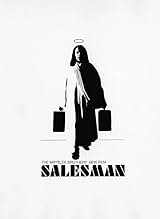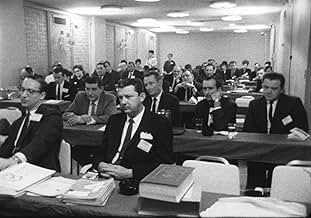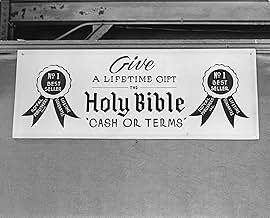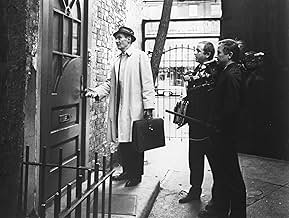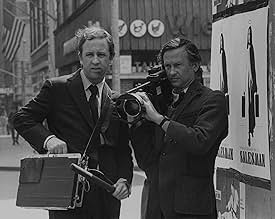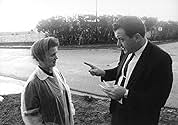IMDb रेटिंग
7.6/10
6 हज़ार
आपकी रेटिंग
अपनी भाषा में प्लॉट जोड़ेंFour dogged door-to-door Bible salesmen travel from Boston to Florida on a seemingly futile quest to sell luxury editions of the Good Book to working-class Catholics.Four dogged door-to-door Bible salesmen travel from Boston to Florida on a seemingly futile quest to sell luxury editions of the Good Book to working-class Catholics.Four dogged door-to-door Bible salesmen travel from Boston to Florida on a seemingly futile quest to sell luxury editions of the Good Book to working-class Catholics.
- पुरस्कार
- कुल 4 जीत
फ़ीचर्ड समीक्षाएं
This film is about the trials and tribulations of four door-to-door Bible salesmen in 1968, on the eve of when their occupation was about to become extinct. Of course, the filmmakers could not know that at the time, but this fact is what adds to the sadness of this film today. The salesmen are four New Englanders named Paul "The Badger" Brennan, James "The Rabbit" Baker, "The Bull" and "The Gipper", their nicknames being derived from their individual sales tactics. Despite the holiness of their products, this really is a cutthroat business, as is made evident in some of the sales meetings that are shown. The main character, "The Badger", reminds me of Jack Lemmon's character in Glengarry Glen Ross. Life - and his profession - have beaten him down, and none of his sales pitches are working as he talks to one indifferent potential customer after another. These guys are always looking for a new angle to make the sale, but usually just about everything they come up with is not successful. Remember, this was in the days when people were unafraid to open their doors to strangers, and equally unafraid to be rude to them. The film not only makes you feel what these unsuccessful salesmen are feeling, it a time capsule for the end of the '60s, and a portrait of an occupation that doesn't really exist anymore due to telemarketing, Internet sales, two-income families meaning nobody is home during the day, and finally the fact that adult strangers on your doorstep are assumed to be potential criminals.
Paul Brennan really seems to have the saddest story of the four. His sales are dwindling, and he is really too old to start over in another occupation. Paul's sales become so poor that at one point that he is partnered with a more aggressive salesman so Paul can observe his technique in the hope that something will rub off on Paul. This younger, sharper salesman, who obviously has not yet developed a tolerance for human frailty, is constantly snapping at Paul for his poor technique and unenthusiastic delivery. If you're an older person who has ever worked for a younger one, you know what I'm talking about. As sorry as you may feel for him though, when we see Paul using the possibly superstitious beliefs of his customers to get them to buy products they may not be able to afford, you have mixed feelings about the man. Is Paul purely being manipulative, or is he resorting to desperate means to survive? Probably a little bit of both is true. Paul realizes that his time as a salesman is coming to a close, and it's not like he has a big bank account to fall back on. Such career struggles are expected when you are in your 20's, but by the time you are Paul's age you are expecting something more...more job stability, more respect, more financial security.
The film does add some humor throughout the film to keep the viewing experience from being too much like a funeral for both Paul's career and the profession of door-to-door salesman itself. Sometimes the salesmen lighten up and even have some camaraderie in their conversations. Sometimes there is a funny remark from the "no sale" Boston housewives the salesmen encounter, and sometimes there are even funnier remarks from the salesmen as they leave a house where they've been refused. There's also an episode in a hotel pool in the middle of the night that is rather humorous.
I'd say that even though the film has a very dated look to it, you should watch it because what it has to say about the human spirit, aging ungracefully, choosing the wrong career, and then failing at that career is timeless.
Paul Brennan really seems to have the saddest story of the four. His sales are dwindling, and he is really too old to start over in another occupation. Paul's sales become so poor that at one point that he is partnered with a more aggressive salesman so Paul can observe his technique in the hope that something will rub off on Paul. This younger, sharper salesman, who obviously has not yet developed a tolerance for human frailty, is constantly snapping at Paul for his poor technique and unenthusiastic delivery. If you're an older person who has ever worked for a younger one, you know what I'm talking about. As sorry as you may feel for him though, when we see Paul using the possibly superstitious beliefs of his customers to get them to buy products they may not be able to afford, you have mixed feelings about the man. Is Paul purely being manipulative, or is he resorting to desperate means to survive? Probably a little bit of both is true. Paul realizes that his time as a salesman is coming to a close, and it's not like he has a big bank account to fall back on. Such career struggles are expected when you are in your 20's, but by the time you are Paul's age you are expecting something more...more job stability, more respect, more financial security.
The film does add some humor throughout the film to keep the viewing experience from being too much like a funeral for both Paul's career and the profession of door-to-door salesman itself. Sometimes the salesmen lighten up and even have some camaraderie in their conversations. Sometimes there is a funny remark from the "no sale" Boston housewives the salesmen encounter, and sometimes there are even funnier remarks from the salesmen as they leave a house where they've been refused. There's also an episode in a hotel pool in the middle of the night that is rather humorous.
I'd say that even though the film has a very dated look to it, you should watch it because what it has to say about the human spirit, aging ungracefully, choosing the wrong career, and then failing at that career is timeless.
"Salesman" isn't quite the Maysles Bros.' (and Charlotte Zwerin's) crowning achievement, although it comes close. I personally feel that "Gimme Shelter" is their best film, but that might have something to do with it being a more enjoyable, if still harrowing film. "Salesman" is an uncomfortable examination of human emotions, and provokes a strong reaction of guilt and sympathy. Some may insist that a documentary has to be somewhat relevant to have any real value, but "Salesman", a film on the lives of door-to-door salesmen, the product of a mostly by-gone era, is pure contradiction of this claim.
A landmark 'cinema verite' film, "Salesman" does not feature any sort of narration or writing, allowing the viewer to take the images presented in the film and interpret them as they wish. There are statements that the Maysles Bros. are probably trying to make with this film, statements about suburbia, statements about the ties between business and organized religion, and more, but the beauty of the film is that it is up to you if you see this in the film or not, because really it is simply a document of an average day for a salesman at the time.
"Salesman" is funny in parts, but taken as a whole it is one of the saddest films you will ever see, a document of the quiet desperation of this lifestyle. The directors of the film make powerful statements, but do so subtly, almost unobtrusively, allowing the viewer to fully engage themselves in the almost routine feel of the film. It is a crime that, despite its strong reputation, relatively few people have seen this essential film from possibly the very best documentary filmmakers there have ever been.
10/10
A landmark 'cinema verite' film, "Salesman" does not feature any sort of narration or writing, allowing the viewer to take the images presented in the film and interpret them as they wish. There are statements that the Maysles Bros. are probably trying to make with this film, statements about suburbia, statements about the ties between business and organized religion, and more, but the beauty of the film is that it is up to you if you see this in the film or not, because really it is simply a document of an average day for a salesman at the time.
"Salesman" is funny in parts, but taken as a whole it is one of the saddest films you will ever see, a document of the quiet desperation of this lifestyle. The directors of the film make powerful statements, but do so subtly, almost unobtrusively, allowing the viewer to fully engage themselves in the almost routine feel of the film. It is a crime that, despite its strong reputation, relatively few people have seen this essential film from possibly the very best documentary filmmakers there have ever been.
10/10
"Salesman" documents the activities of Bible salesmen as they go on the road to sell their wares to "leads" garnered from Catholic churches. It's a tough life, especially when many prospects cannot afford the cost of these illustrated Bibles.
It is difficult not to compare this film to Mamet's "Glengarry Glen Ross". It details the hardships and humiliations of men who earn their egos through sales. Anyone who has ever sold a product door to door can relate to this film.
The transparent sales techniques. The smug sales aphorisms. The roller-coaster ride from day to day. It is all there.
It is easy to draw conclusions or morals from this documentary. The most obvious refers to the soul-sucking depression that comes from spending your life doing something you do not enjoy or believe in.
As a time capsule of life in the late 60s, the film is enjoyable. Seeing everyone smoking cigarettes nonstop, for example, is a reminder of how things have changed.
It is difficult not to compare this film to Mamet's "Glengarry Glen Ross". It details the hardships and humiliations of men who earn their egos through sales. Anyone who has ever sold a product door to door can relate to this film.
The transparent sales techniques. The smug sales aphorisms. The roller-coaster ride from day to day. It is all there.
It is easy to draw conclusions or morals from this documentary. The most obvious refers to the soul-sucking depression that comes from spending your life doing something you do not enjoy or believe in.
As a time capsule of life in the late 60s, the film is enjoyable. Seeing everyone smoking cigarettes nonstop, for example, is a reminder of how things have changed.
'Salesman" is a stark reminder of the evolution of the modern documentary. As a viewer I did not feel manipulated by the editing or the filmmaker's ego or perspective. The film is a historical recording of an occupation from a by gone era that promised all the perks of the American Dream while leaving many that chose it for their career living lives of quiet desperation, poor and void of any significant contribution to society.
One of the thoughts this film left me with was how many occupations in twenty-first century America are sales dependent. Selling oneself, an idea, candidate, lifestyle, fill in the blank for an alternative to "bible." Pounding the proverbial pavement to pay the mortgage with little regard to the negative impact ones profession may have on society or nameless, faceless individuals. In today's world fortunes are made as life coaches, motivational speakers, politics, infomercials, winning American Idol, all variations of selling something to a consumer society that can ill afford the debt.
"Salesman" is a timeless film and a brilliant reminder of the origins of the documentary.
One of the thoughts this film left me with was how many occupations in twenty-first century America are sales dependent. Selling oneself, an idea, candidate, lifestyle, fill in the blank for an alternative to "bible." Pounding the proverbial pavement to pay the mortgage with little regard to the negative impact ones profession may have on society or nameless, faceless individuals. In today's world fortunes are made as life coaches, motivational speakers, politics, infomercials, winning American Idol, all variations of selling something to a consumer society that can ill afford the debt.
"Salesman" is a timeless film and a brilliant reminder of the origins of the documentary.
Documentaries are a fairly pervasive genre in today's culture, and an increasing trend is to manipulate the footage in order to further the authentication of one's thesis. Albert and David Maysles' 1969 documentary 'Salesman' however, turns an unflinching eye on its' subjects, sometimes with unnerving and disturbing results.
'Salesman' follows four door-to-door high-end bible salesmen as they travel around the country. The four men have nicknames they've given each other, all describing their sales approach: The Rabbit, The Badger, The Gipper and The Bull. We hear most from The Badger (Paul Brennan) as he takes his leads and tries to pull himself out of a sales slump. The leads that most of the salesmen follow end up being poor Catholic families who can't even afford a dollar a week payment, but are at times talked into it anyway by the sales tactics these men employ.
The Maysles give us an absolutely fascinating look at the world of door-to-door sales, but it is also a disturbing door to open. The pressure that the salesmen use when trying to sell the product, and the struggle that the prospects exhibit, is difficult to watch. In one scene, Brennan goes to the door of a recent customer to pick up their down payment for another of the salesmen and pretty much refuses to take 'No' for an answer, telling her that he's the salesman's boss and is going to have to dock him a fee if she cancels the sale, eventually guilting this family who clearly cannot take on another installment payment into going on with the sale. On the other hand, we also see sales meetings where the pressure is turned on the salesmen themselves, so it's clear that the threats of unemployment are a definite motivator.
I wondered throughout the film if David Mamet had seen this film and subsequently used it as inspiration for 'Glengarry Glen Ross'. From the sales meeting where the manager threatens the salesmen to the characters themselves, I saw several clear comparisons. Brennan is Lemmon's 'Shel' character to a tee, and I subsequently couldn't help chuckling at the image of The Simpsons' character 'Gil'. Whatever specific inspiration 'Salesman' has provided, it is clearly an important film that does not soften its edges. 7/10
'Salesman' follows four door-to-door high-end bible salesmen as they travel around the country. The four men have nicknames they've given each other, all describing their sales approach: The Rabbit, The Badger, The Gipper and The Bull. We hear most from The Badger (Paul Brennan) as he takes his leads and tries to pull himself out of a sales slump. The leads that most of the salesmen follow end up being poor Catholic families who can't even afford a dollar a week payment, but are at times talked into it anyway by the sales tactics these men employ.
The Maysles give us an absolutely fascinating look at the world of door-to-door sales, but it is also a disturbing door to open. The pressure that the salesmen use when trying to sell the product, and the struggle that the prospects exhibit, is difficult to watch. In one scene, Brennan goes to the door of a recent customer to pick up their down payment for another of the salesmen and pretty much refuses to take 'No' for an answer, telling her that he's the salesman's boss and is going to have to dock him a fee if she cancels the sale, eventually guilting this family who clearly cannot take on another installment payment into going on with the sale. On the other hand, we also see sales meetings where the pressure is turned on the salesmen themselves, so it's clear that the threats of unemployment are a definite motivator.
I wondered throughout the film if David Mamet had seen this film and subsequently used it as inspiration for 'Glengarry Glen Ross'. From the sales meeting where the manager threatens the salesmen to the characters themselves, I saw several clear comparisons. Brennan is Lemmon's 'Shel' character to a tee, and I subsequently couldn't help chuckling at the image of The Simpsons' character 'Gil'. Whatever specific inspiration 'Salesman' has provided, it is clearly an important film that does not soften its edges. 7/10
क्या आपको पता है
- ट्रिविया49.95 U.S. Dollars (which is what the Bibles sold by the salesmen cost in 1965-66, the time of the movie) is the equivalent of about $500 in 2025.
- कनेक्शनFeatured in Camera Three: Direct Cinema: Part 1 (1969)
टॉप पसंद
रेटिंग देने के लिए साइन-इन करें और वैयक्तिकृत सुझावों के लिए वॉचलिस्ट करें
- How long is Salesman?Alexa द्वारा संचालित
विवरण
- रिलीज़ की तारीख़
- कंट्री ऑफ़ ओरिजिन
- आधिकारिक साइटें
- भाषा
- इस रूप में भी जाना जाता है
- The Maysles Brothers' Salesman
- फ़िल्माने की जगहें
- Auburn, मैसाचुसेट्स, संयुक्त राज्य अमेरिका(The Yankee Drummer Inn)
- उत्पादन कंपनी
- IMDbPro पर और कंपनी क्रेडिट देखें
बॉक्स ऑफ़िस
- बजट
- $1,05,000(अनुमानित)
- चलने की अवधि
- 1 घं 31 मि(91 min)
- रंग
- ध्वनि मिश्रण
- पक्ष अनुपात
- 1.37 : 1
इस पेज में योगदान दें
किसी बदलाव का सुझाव दें या अनुपलब्ध कॉन्टेंट जोड़ें


